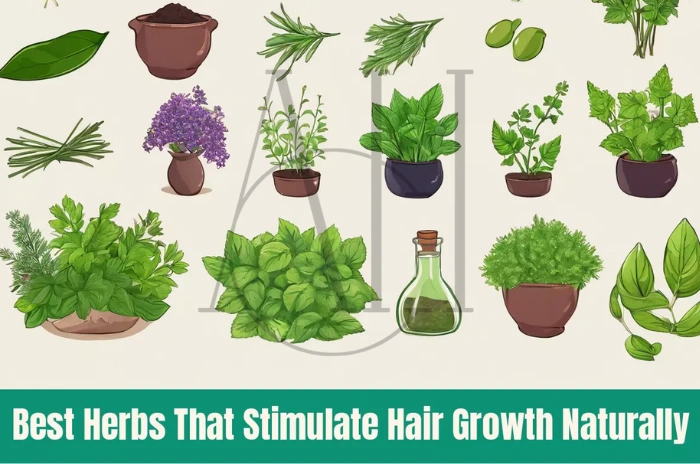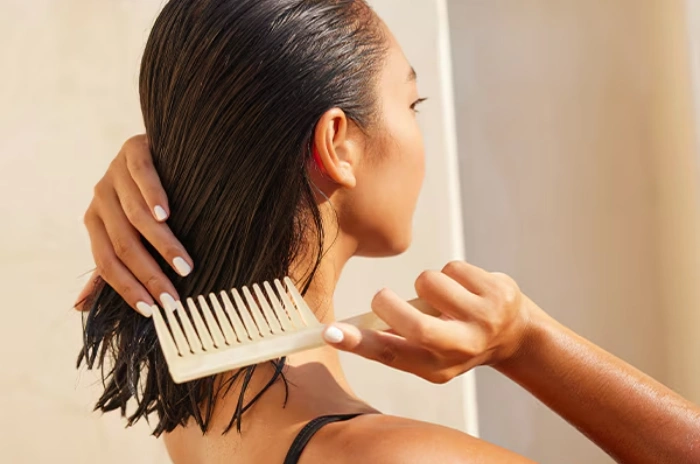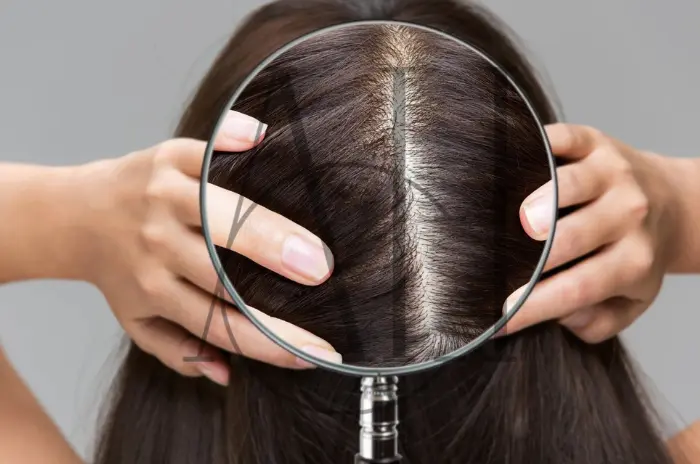Achieving healthy, strong hair doesn’t always require expensive treatments or chemical products. Herbal hair rinses have been used for centuries as a natural way to promote hair growth, strengthen locks, and improve overall scalp health. These gentle yet effective treatments harness the power of nature’s botanicals to nourish your hair from root to tip.
Modern hair care routines can benefit greatly from incorporating traditional herbal hair rinse recipes that our ancestors relied upon. These natural solutions work by delivering essential nutrients directly to your scalp and hair follicles, creating an optimal environment for healthy hair growth while avoiding the harsh chemicals found in many commercial products.
Whether you’re dealing with hair thinning, slow growth, or simply want to enhance your hair’s natural beauty, herbal rinses offer a gentle and sustainable approach to hair care that works with your body’s natural processes rather than against them.
Table of Contents
ToggleWhat Are Herbal Hair Rinses?
Herbal hair rinses are liquid preparations made by steeping beneficial herbs in hot water, similar to making tea. These nutrient-rich solutions are applied to freshly washed hair and scalp as a final rinse step in your hair care routine. Unlike leave-in treatments, these rinses are typically not rinsed out with plain water afterward.
The process involves extracting water-soluble vitamins, minerals, and phytonutrients from specific herbs known for their hair-beneficial properties. These compounds penetrate the hair shaft and scalp, delivering targeted nutrition that supports healthy hair growth and strengthens existing strands.
DIY hair rinse for natural hair preparations are cost-effective and customizable to your specific hair needs. You can create single-herb rinses or blend multiple herbs to address various concerns simultaneously. The beauty of herbal rinses lies in their simplicity and the fact that you control exactly what goes into your hair care routine.
Most herbal hair rinse recipes use a basic ratio of one to two tablespoons of dried herbs per cup of boiling water. Fresh herbs can also be used, typically requiring double the amount due to their higher water content.
Best Herbs for Natural Hair Growth
Several herbs have gained recognition as particularly effective for promoting hair growth and scalp health. Rosemary stands out as one of the most researched herbs for hair growth, with studies showing it can be as effective as conventional treatments. Rosemary water hair growth benefits include improved circulation to the scalp and antioxidant protection for hair follicles.
Nettle is another powerhouse herb rich in iron, silica, and vitamins A and C. Nettle hair rinse benefits include strengthening hair strands, reducing hair fall, and providing essential minerals that support healthy hair growth. The high silica content in nettle helps improve hair’s shine and elasticity.
Fenugreek for hair has been used in traditional medicine for centuries. These seeds contain proteins and nicotinic acid that help strengthen hair roots and promote growth. Fenugreek also contains lecithin, which adds natural shine and helps repair damaged hair.
Hibiscus flowers are rich in amino acids and vitamin C, making them excellent for hibiscus help hair growth treatments. They help condition the hair naturally while promoting circulation to the scalp, which encourages new hair growth.
Peppermint and other scalp stimulating herbs create a cooling sensation that increases blood flow to hair follicles. This improved circulation delivers more nutrients to the hair roots, supporting stronger and faster hair growth.
How to Use Herbal Rinses for Best Results
Proper application technique maximizes the benefits of your herbal hair rinse. Start with freshly washed hair using a gentle, sulfate-free shampoo. Your hair should be clean but still damp when applying the herbal rinse.
Prepare your rinse by steeping the herbs in hot water for 15-20 minutes, then strain out the plant material. Allow the liquid to cool to a comfortable temperature before application. Pour the rinse slowly over your scalp and hair, making sure to massage it into your scalp with your fingertips.
Focus particularly on areas where you want to encourage growth or where you’ve noticed thinning. The massaging action helps increase circulation and ensures the herbal nutrients reach your hair follicles effectively. Leave the rinse in your hair without rinsing with plain water afterward.
For tea rinse for hair growth applications, you can also use a spray bottle to distribute the rinse evenly throughout your hair. This method works especially well for longer hair or when targeting specific areas of concern.
Some people prefer to do a final cool water rinse after the herbal treatment, which can help seal the hair cuticle and lock in the beneficial compounds. However, this step is optional and depends on your hair type and personal preference.

Key Herbs That Help Hair Grow
Understanding which herbs provide specific benefits helps you create targeted healthy hair herbs combinations. Rosemary contains carnosic acid, which has been shown to promote nerve growth and improve circulation. This makes rosemary hair rinse particularly effective for people experiencing hair thinning or slow growth.
Saw palmetto is often called a natural alternative to minoxidil because it may help block DHT, a hormone linked to hair loss. While more research is needed, many people report positive results when using saw palmetto in their hair care routine.
Horsetail is exceptionally high in silica, a mineral essential for hair strength and growth. Regular use of horsetail rinses can help reduce breakage and improve hair’s overall resilience.
Green tea contains catechins and caffeine, both of which may help stimulate hair follicles and extend the growth phase of the hair cycle. Tea rinse for hair growth using green tea is particularly beneficial for those with thinning hair.
Ginseng has been shown in studies to promote hair growth by increasing the number of dermal papilla cells, which play a crucial role in hair follicle development and the hair growth cycle.
Lavender not only smells wonderful but also has antimicrobial properties that help maintain a healthy scalp environment. A healthy scalp is essential for optimal hair growth.
How Often to Use Herbal Rinses
The frequency of herbal hair rinse use depends on your hair type, scalp condition, and specific goals. Most people see best results using herbal rinses 2-3 times per week. This frequency allows your hair and scalp to benefit from the nutrients without overwhelming them.
For people with oily hair or scalp conditions, daily use might be beneficial initially. Peppermint rinse for oily scalp can be used more frequently because peppermint helps balance oil production and provides a refreshing cleansing effect.
Those with dry or damaged hair should start with once or twice weekly applications and adjust based on how their hair responds. Some herbs can be drying if used too frequently, so it’s important to monitor your hair’s condition and adjust accordingly.
When comparing herbal rinse vs. rice water for hair, both can be used regularly, but alternating between different treatments often provides the best results. This rotation prevents your hair from becoming too accustomed to one treatment and ensures a variety of nutrients.
Consistency is more important than frequency. Regular use of herbal rinses over several months typically produces more noticeable results than sporadic intensive treatments.
Benefits of Herbal Rinses for Natural Hair Growth
Natural hair growth remedies like herbal rinses offer multiple advantages beyond just promoting growth. They improve scalp health by providing essential nutrients directly to hair follicles while maintaining the scalp’s natural pH balance.
Unlike synthetic treatments, DIY hair rinses are gentle and rarely cause adverse reactions. They work harmoniously with your hair’s natural processes, supporting rather than forcing growth. This gentle approach makes them suitable for long-term use without the side effects associated with some commercial products.
Herbal rinses also provide immediate cosmetic benefits. They can add natural shine, reduce static, and improve hair’s manageability. Many herbs contain natural conditioning agents that smooth the hair cuticle and reduce frizz.
The ritual of preparing and applying herbal rinses can also be therapeutic and stress-reducing. Since stress is a known factor in hair loss, this psychological benefit shouldn’t be underestimated.
Cost-effectiveness is another significant advantage. Best herbs for natural hair growth are readily available and affordable, making this approach accessible to everyone regardless of budget constraints.
Environmental benefits include reduced packaging waste and chemical runoff compared to commercial products. Herbal hair rinse recipes use biodegradable ingredients that are gentler on both your hair and the environment.
Finally, herbal rinses are completely customizable. You can adjust the strength, combine different herbs, and modify recipes based on seasonal changes or evolving hair needs.
FAQ : Herbal Hair Rinses for Natural Hair Growth and Stronger Locks
What is an herbal hair rinse?
An herbal hair rinse is a liquid preparation made by steeping beneficial herbs in hot water and applying it to clean hair and scalp to promote growth and health.
What are the best growth herbs?
The best herbs for natural hair growth include rosemary, nettle, fenugreek, hibiscus, horsetail, and peppermint, each offering unique nutrients for hair health.
How do I make a rinse?
To make a DIY hair rinse for natural hair, steep 1-2 tablespoons of dried herbs in one cup of boiling water for 15-20 minutes, strain, cool, and apply to damp hair.
How often should I use hair rinse?
Most people achieve best results using herbal hair rinses 2-3 times per week, though frequency can be adjusted based on hair type and individual needs.




